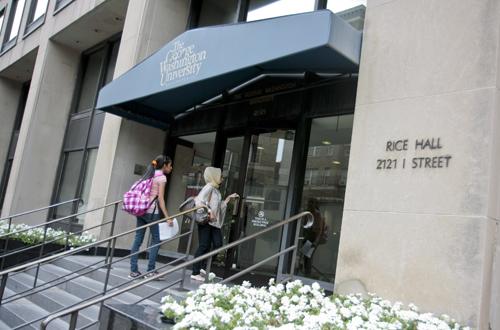
The University discovered asbestos in Rice Hall during renovations and conducted an abatement in early August, a health and safety official said.
The seventh floor of Rice Hall – the building that houses GW’s highest ranking officials – is undergoing upgrades and the asbestos abatement was a precursor to the renovations, William Flint, director of the office of health and safety, said.
Individuals exposed to asbestos, a fiber that has been commonly used in building materials, can contract severe health problems if they inhale the substance when it is in the air. The Environmental Protection Agency outlines construction rules for structures that might have asbestos-containing materials.
“GW has an asbestos policy that guides the maintenance of asbestos-containing materials in University buildings,” Flint said. “Prior to renovation or demolition of any University building, a hazardous materials survey is conducted using District of Columbia and EPA regulations to determine the risk to students, staff, faculty and construction workers. If hazardous materials are discovered, proper abatement is conducted to remove the materials prior to construction or demolition.”
“Asbestos is a common problem in demolition sites of older buildings, but proper testing and mitigation prior to demolition protects all members of the University community from exposure to hazardous materials,” Flint said.
Senior Associate Vice President for Safety and Security Darrell Darnell said the University community will not see any adverse health affects due to asbestos, but declined to comment on where specifically asbestos was found in Rice Hall – for example, in the walls, around pipes or in the floors or tiles.
The week-long asbestos abatement in Rice Hall began Aug. 5, shutting down elevator service to the seventh floor of the building as a safety precaution. The area was also enclosed with protective materials while air samples were taken to test their quality.
Keith Bailey, a compliance safety and health officer with the Occupational Safety and Health Administration, said OSHA would not get involved with the asbestos situation so long as no complaints are filed to the agency about overexposure to the asbestos beyond permissible levels.
Officials checked the University Parking Garage, currently being torn down to make way for the Science and Engineering Complex, for asbestos prior to beginning any demolition.



